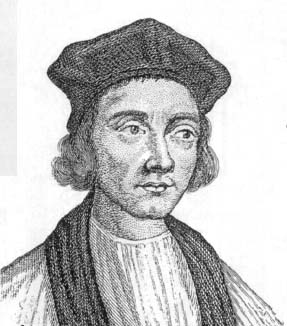
John Feckenham O.S.B., also known as John Howman of Feckingham and later John de Feckenham or John Fecknam, was an English churchman, the last abbot of Westminster.

Cuthbert Tunstall was an English humanist, bishop, diplomat, administrator and royal adviser. He served as Bishop of Durham during the reigns of Henry VIII, Edward VI, Mary I and Elizabeth I.

Sir William Cordell of Melford Hall in the parish of Long Melford, Suffolk, was an English lawyer, landowner, administrator and politician who held high offices under both the Catholic Queen Mary I and the Protestant Queen Elizabeth I.
Ralph Baines or "Bayne" was the last Roman Catholic Bishop of Lichfield and Coventry, in England.
Events from the 1550s in England. This decade marks the beginning of the Elizabethan era.
Thomas Sedgwick (Segiswycke) was an English Roman Catholic theologian. An unfriendly hand in 1562 describes him as "learned but not very wise".
Henry Cole was a senior English Roman Catholic churchman and academic.
John Harpsfield (1516–1578) was an English Catholic controversialist and humanist.
Arthur Yeldard (c.1530–1599) was an English clergyman and academic, chosen as the first Fellow and second President of Trinity College, Oxford.

John Young (1514–1580) was an English Catholic clergyman and academic. He was Master of Pembroke Hall, Cambridge, and was later imprisoned by Elizabeth I. He is not John Young (1534?–1605), Master of Pembroke Hall later in the century, and afterwards Bishop of Rochester.
Hugh Weston was an English churchman and academic, Dean of Westminster and Dean of Windsor, and Rector of Lincoln College, Oxford.
Seth Holland was an English Roman Catholic churchman, Dean of Worcester and Warden of All Souls' College, Oxford under Queen Mary, but imprisoned in the Marshalsea under Elizabeth I, where he died.
George Lily was an English Roman Catholic priest, humanist scholar, biographer, topographer and cartographer.
Francis Babington D.D. was an English divine and an academic administrator at the University of Oxford. He was elected Master (head) of Balliol College, Oxford on 2 September 1559, a post he held until he resigned the following year on 27 October 1560. Babington was Vice-Chancellor of Oxford University from 1560 to 1562. He was also Rector of Lincoln College, Oxford, from 1560 until he resigned in 1563.
The history of Trinity College, Oxford documents the 450 years from the foundation of Trinity – a collegiate member of the University of Oxford – on 8 March 1554/5. The fourteenth oldest surviving college, it reused and embellished the site of the former Durham College, Oxford. Opening its doors on 30 May 1555, its founder Sir Thomas Pope created it as a Catholic college teaching only theology. It has been co-educational since 1979.
John Philpot was an Archdeacon of Winchester and an English Protestant martyr. He was burned at the stake in Smithfield on 18th December 1558. The story of his imprisonment and execution is recorded in Foxe's Book of Martyrs published in 1563.
Alban Langdale or Langdaile was an English Roman Catholic churchman and author.
John Pory (1502/03–1570) was an English churchman and academic, Master of Corpus Christi College, Cambridge.
Edward Hawford D.D. was an English churchman and academic, Master of Christ's College, Cambridge from 1559. While Hawford was a somewhat conservative and administrative-minded academic politician head of house, no friend of religious enthusiasm and suspected of covert Catholicism. Christ's became a Puritan centre under his mastership.
Thomas Peacock was an English cleric and college head.




